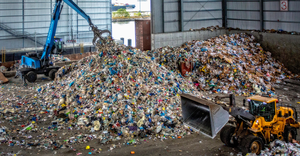You've Got Recycling Questions, We've Got Answers! (Part Three)
 This is the third part of a series that provide answers by industry experts to questions you have about recycling. The questions came out of Waste360’s recent webinar on the cost of recycling. For further discussion on these issues, don’t miss the Waste360 Recycling Summit in Chicago later this year.
This is the third part of a series that provide answers by industry experts to questions you have about recycling. The questions came out of Waste360’s recent webinar on the cost of recycling. For further discussion on these issues, don’t miss the Waste360 Recycling Summit in Chicago later this year.
Read part one here; part two here.
Question: What is the average monthly waste and recycling costs for a commercial location?
Michele Nestor, president, Nestor Resources Inc.: This is the most frequently asked question and one that always gets the same response from me: “There is no average." Claiming so would be misleading. Although often criticized, there are legitimate reasons why two customers sitting right next to one another, franchises in different locations or communities with identical bid specifications may pay more or less than one another. Whether it is for commercial or residential service, we have failed as an industry to communicate the many variables that go into "the price." Time, fuel, labor, insurance, fees, equipment, volume, weight, frequency, debt, shareholder expectations, etc. Frankly, some service providers are simply more efficient than others and therefore can have a higher profit margin even when the customer pays less. A big influencing, but often misunderstood, factor is that customers/municipalities could significantly reduce their prices by relinquishing unrealistic time and service constraints in their contracts.
Question: Recycling costs money. If landfill fees would go up and adequately accommodate true cost of landfilling and true cost of raw materials. Why aren't we focusing on developing the market that produces jobs, reduces carbon footprint and increases overall revenue?
Albe Zakes, global vice president, communications, TerraCycle Inc.: This is a key challenge to recycling. Industry and consumers alike feel that recycling is a costly alternative to landfill or incineration because they don't fully understand the cost of those other end-of-life solutions. When you consider the potential value recovered in reselling the recycled materials, the push to recycle more materials–instead of burying or burning it–begins to make ecological and economic sense. In addition, a more robust recycling industry creates more, jobs, more supply chain security and only further reduces how governmental dependence and economic stability is based on oil and other commodity prices.
Question: Could you please elaborate further on the dependence of mixed waste processing on its ability to recuperate recyclables?
Harvey Gershman, president, Gershman, Brickner & Bratton Inc.: A mixed waste processing facility (MWPF) relies upon sophisticated equipment to separate marketable recyclables from a municipal waste stream (MSW). At the front end of the facility, feedstock goes through a series of screens, magnets and sorts (very similar to those used in a traditional recycling facility) to separate recyclable containers and paper from its organic components (food, wood, contaminated paper, etc.) and residuals (batteries, rocks, and other non-recyclables). The quantity of materials that is recovered will depend on the level of a MWPF’s automation, how modern its equipment is, whether the organic fraction is processed for recovery and the availability of markets for the separated recyclables. Metals and plastic containers seem to recover very well in MWPF. Contamination issues are of greater concern for the paper stream. High-end paper markets demand that paper not be overly wet, contain large quantities of glass or putrescible materials. Because the incoming paper has been mixed with wastes of all varieties it is more likely to have come in contact with these contaminants–rendering it less likely to meet the high-end market standards. This does not mean that the paper is not marketable. It does mean, however, that markets will need to be identified that can tolerate some contamination in the bales. A more in-depth explanation on a modern MWPF similarity to MRFs and ability to recover materials is discussed in The Evolution of Mixed Waste Processing Facilities, 1970-Today, a report for the American Chemistry Council.
Eric Herbert, CEO, Zero Waste Energy LLC: Mixed waste processing can offer some significant advantages. A materials recovery facility (MRF) that accepts mixed solid waste receives the entire waste stream, not just the customer source-separated stream. Recent studies have shown that single-stream collection programs have access (participation) to less than 20 percent of available commodities such as paper, plastics and metals. With a mixed waste or “one bin” program, processors have access to 100 percent of available recoverables. It’s then up to the system to maximize recovery. Advanced mixed waste processing systems utilize sophisticated technologies and processes that have demonstrated recovery numbers far greater than previous systems. In addition to lower collection costs and the participation advantage, these advanced systems can also capture organics and create engineered fuel from items that would otherwise go to landfill or go unrecovered in a single-stream system.
Michele Nestor: There seems to be confusion on the purpose of certain contract terms that are viewed as penalties for the community trying to recycle in other ways. The truth is that there is really no sense in investing in a process to mine materials unless there are materials remaining in the mix that can be retrieved. A big part of the Performa in determining the feasibility of a project would be the types, quantities and anticipated values of the materials one would hope to recover and market. If those materials were allowed to be removed by third parties prior to the expected "mix" reaching the facility, the operator's return on investment would be negatively affected by reduced amounts of material to market, and the facility would either have to increase customer rates or go out of business. So those contract terms are there to ensure their rights to recover and recycle the materials in exchange for third investment in the facility.
About the Author(s)
You May Also Like


